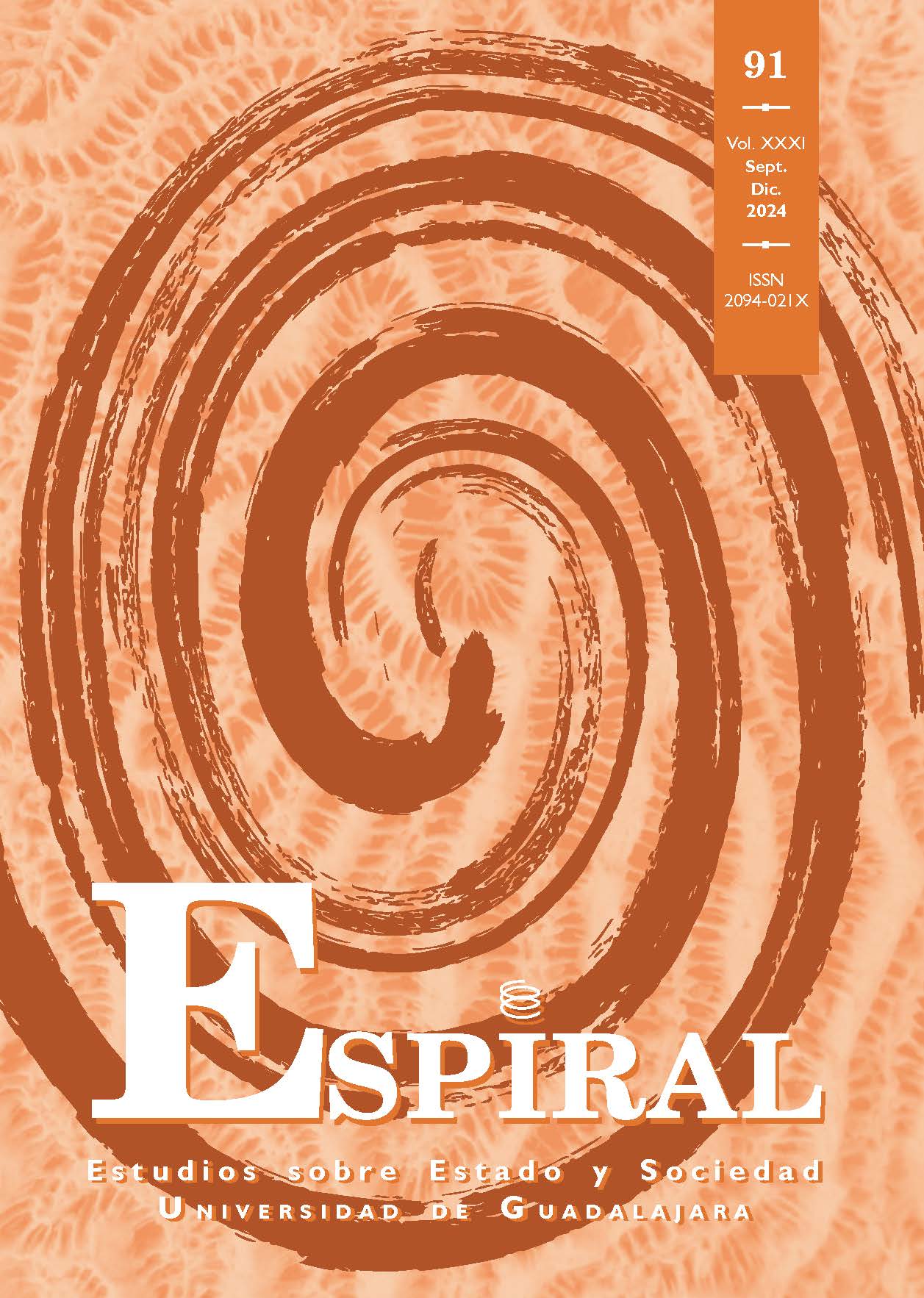Energy Poverty and Vulnerability in México:
characterization based on local energy uses
DOI:
https://doi.org/10.32870/eees.v31i91.7364Keywords:
sustainability, energy poverty, technology and society, colaborative methodologies, energy transitionAbstract
Objective. Describe the local energy systems in three municipalities of Jalisco to characterize the energy vulnerability condition, as well as the actors involved and the community strengthening strategies implemented. Methodology. Collaborative diagnoses and network discussions were carried out for a better understanding of the problem from the local reality. Results. The energy chain is characterized from local context, the description of the users and recipients of the services, as well as their familiar and collectives uses. Conclusions. The concepts of poverty and vulnerability must consider the singularities of the rural world, where domestic and productive activities often coexist, as well as collective and public users, such as municipalities. Understanding this energy chain in depth will allow generating strategies towards a fair energy transformation from the local level.Downloads
References
Bertinat, Pablo (2016) Transición energética justa: pensando la democratización energética. Montevideo: Fundación Friedrich-Ebert-Stiftung. https://tallerecologista.org.ar/ wp-content/uploads/2019/02/Doc.-FES-2016.pdf
Boardman, Brenda (1991) Fuel poverty: from cold homes to affordable warmth. Michigan: Pinter PubLimited.
Boardman, Brenda (1991) ‘Fuel poverty is different’, Policy Studies, vol. 12, no. 4, pp. 30–41.
Bouzarovski, Stefan & Petrova, Saska (2015) A global perspective on domestic energy deprivation: Overcoming the energy poverty-fuel poverty binary. Energy Research and Social Science. 10. 31-40. dx.doi.org/10.1016/j.erss.2015.06.007
Bradshaw, Jonathan and Hutton, Sandra. (1983) ‘Social policy options and fuel poverty’, Journal of Economic Psychology, vol. 3, pp. 249–266. https://doi.org/10.1016/0167-4870(83)90005-3
Castaño, Raul , Solís, Jaime y Marrero, Madelyn (2020) Midiendo la pobreza energética. Una revisión de indicadores. Revista Hábitat Sustentable Vol. 10, N°. 1. ISSN 0719 - 0700 / Págs. 8 -21. https://doi.org/10.22320/07190700.2020.10.01.01
Corona Berkin, Sarah (2020) La producción horizontal del conocimiento. Guadalajara: UDG, UCR, UNSAM y FLACSFicha (APA)
Fenoglio, Valeria (2019) Innovación tecnológica en la resolución de problemáticas socio-productivas locales. Caso de estudio: Concordia, Entre Ríos-Argentina. Rev. Hábitat sustentable [online]. vol.9, n.2, pp.94-107.
García Ochoa, Rigoberto (2014) Pobreza energética en América Latina. Serie: Documentos de Proyecto Cepal. Cepal-Naciones Unidas: Santiago de Chile.
García Ochoa, Rigoberto y Graizbord, Boris. (2016) Caracterización espacial de la pobreza energética en México. Un análisis a escala subnacional. Economía, Sociedad y Territorio XVI, núm. 51. 289-337.
Guzowski, Carina, Ibañez Martín, María María y Zabaloy, María Florencia (2021) Pobreza Energética: Conceptualización y su Vínculo con la Exclusión. Breve Revisión para America Latina. Ambiente & Sociedade. São Paulo, v. 24, 1-22, DOI: http://dx.doi.org/10.1590/1809-4422asoc20200027r2vu2021L2DE
Méndez, Florencia Magdalena; Rosa, Paula Cecilia y Castelao, María Eugenia (2021) Propuesta teórica-metodológica para el análisis multidimensional de la pobreza energética en Argentina. Ciencia, docencia y tecnología 32. Núm.62. 1-26 https://doi.org/10.33255/3262/748
Naciones Unidas (2018) La Agenda 2030 y los Objetivos de Desarrollo Sostenible: una oportunidad para América Latina y el Caribe (LC/G.2681-P/Rev.3), Santiago.
Pellicer-Sefris, Victoria. (2018) Ampliando la comprensión de la pobreza energética desde el enfoque de capacidades: hacia una mirada construida desde las personas afectadas. Iberoamerican Journal of Development Studies 7(2):138-163. DOI: 10.26754/ojs_ried/ijds.295"O.
Ricci, Emilio y Concha, Roberto, eds. (2018) Innovación Social: Consolidación Modelo Multihélice en la Región de Antofagasta. Ediciones Universidad Católica del Norte - UCN. ISBN 978-956-287-418-2.
Ripple, W., Wolf, C., Newsome, T.M., Barnard, P., Moomaw, W.R. (2020) World Scientists’ Warning of a Climate Emergenc. BioScience (70-1), 8–12. https://doi.org/10.1093/biosci/biz088
Rojas Herrera, J. J. (2021). La economía social solidaria y la política social del nuevo gobierno federal. Nóesis. Revista De Ciencias Sociales, 29(57), 68–87. https://doi.org/10.20983/noesis.2020.1.4
Santos, Boaventura da Souza (2010) Descolonizar el saber, reinventar el poder. Uruguay: Ediciones Trilce.
Thomas, Hernán y Becerra, Lucas (2014) Sistemas tecnológicos para el desarrollo inclusivo sustentable. Revista Voces en el Fénix, (37), 120-129.
Urkidi Leire, Lago Rosa, Basurko Izaro, Mantxo Martín, Barcena Iñaki y Akizu, Orzti. (2015) Transiciones energéticas: sostenibilidad y democracia energética. Euskal Herriko Unibertsitatea, Argitalpen Zerbitzua. Bilbao.
Downloads
Published
How to Cite
Issue
Section
License
Open access policy
Authors who publish in this journal accept the following conditions:
In accordance with the legislation of copyright, Espiral Estudios sobre Estado y Sociedad recognizes and respects the moral rights of the authors, as well as their equity ownership, which will be given to the journal to for diffusion on open access. Espiral does not charge authors for sending and processing their articles for publication.
The authors are able to engage in independent and additional contractual agreements for the non-exclusive distribution of the article’s version published in Espiral (for example, to include it in an institutional repository or publish it in a book) provided that they clearly indicate that the work was published for the first time in Espiral.
For all of the above, the authors (s) must send a format of a letter of transfer of property rights on the first publication duly completed and signed by the author (s). This format can be sent via email in PDF file to the email espiral.udeg@gmail.com. (Letter of transfer of author property rights)
![Espiral Estudios sobre Estado y Sociedad [eISSN: 2594-021X]](https://espiral.cucsh.udg.mx/public/journals/10/pageHeaderLogoImage_es_ES.jpg)

